History Statement of Intent for CMS
We want history to inspire and ignite pupils’ curiosity and for them to be able to make sense of the present as well as the past. We want our pupils to embrace the community in which it is situated and recognise our local history and national heritage. Our history curriculum allows our pupils to build knowledge and understanding in order to gain an informed historical perspective on their world.
Our History intent aims to ensure that all pupils:
- Engage in a valid historical enquiry or puzzling key question through which the learning grows over a sequence of lessons.
- Have a coherent, chronological knowledge and understanding of Britain’s past and that of the wider world.
- Understand the complexity of people’s lives, the process of change, the diversity of societies and relationships between different groups, as well as their own identity and the challenges of their time.
- Ask perceptive questions, think critically, weigh evidence, sift arguments, and develop perspective and judgement
- Build knowledge of substantive concepts such as empire, invasion, church and monarchy.
Curriculum Across the Year
- In KS2 pupils receive one lesson of History per week
- In KS3 Year 7 pupils receive one lesson of History per week.
- In KS3 Year 8 pupils receive two lessons of History per week.
Key Components
KS2
| Year 5 | Anglo Saxons | Explore the beginnings of the monarchy through Anglo-Saxon kings and investigate life in Anglo-Saxon times. | |||||
| The Mayan Civilisation | Explore the Mayan civilisation and its achievements | ||||||
| The Kingdom of Benin | Explore the kingdom of Benin before European involvement | ||||||
| The Victorians | Explore Queen Victoria and how Britain changed under her rule making local history links with Northumberland. | ||||||
| Battle of Britain | Investigate a significant turning point in British history | ||||||
| Year 6 | The Vikings | Study of an area of local historical significance, exploring Viking raids and invasions. | |||||
| The Titanic Disaster | Explore local industrial history and develop knowledge and understanding of an historical event. | ||||||
| Coal Mining | Develop the beginnings of knowledge about the Industrial revolution with the discovery of coal and its importance. | ||||||
KS3
| Year 7 | Norman Conquest | Investigate change and continuity under Norman rule. | Medieval Monarchs | Study a range of medieval monarchs and evaluate who was the most successful. | |
| Medieval Society | Examine everyday life in the Middle Ages.
Investigate disease and revolt in the medieval era. |
||||
| Wars of the Roses | Study major events of the Wars of the Roses and examine the role of women. | The Renaissance | Examine the Italian Renaissance and its impact on Europe. | ||
| Year 8 | The Tudors | Investigate the Tudor dynasty and the impact of the Reformation on England. | The Stuarts | Explore the relationship between the Stuart monarchs and Parliament, and its impact on Britain. | |
| Empire | Study a range of empires across the world and evaluate success. . | Slavery | Investigate the role of slavery in the British Empire and its abolition, | ||
| Revolutions | Investigate a range of revolutions and how they changed the world. | 1968:
Transition Project |
Explore major events in 1968 and identify why it was such a significant year. | ||
Websites
There is a wealth of information on the internet about the topics covered in the curriculum. You could:
- Watch Horrible Histories – A fun way to learn quick facts about historical time periods. –
- Explore BBC bitesize – KS2 BBC Bitesize
- KS3 BBC Bitesize
- National Geographic – some useful history resources found there
Homework
Within History homework is set to provide opportunities for pupils to consolidate learning, deepen understanding and give opportunities to practise and develop skills ensuring students’ progress and raising achievement. In History homework will be focused around the 3Rs (Reading, Retrieval and Research).
| Reading | Retrieval | Research |
| Regular reading helps develop cognitive abilities. | Retrieval (recap) activities help students to strengthen their memory and recall information from their learning, leading to deeper learning and understanding. | Research activities enable pupils to deepen and extend their understanding further. |

Reading

Helpful resources for learning
Parent Info
Fun ways to inspire children with history.
You could:
- Read around the topic you are studying
- Choose a relevant book from the reading road!
- Take a trip to a museum or historic site
History Assessments
Pupils are formally assessed throughout both KS2 and KS3. Assessments may include:
- Multiple choice questions
- Short answer questions
- An extended written response

